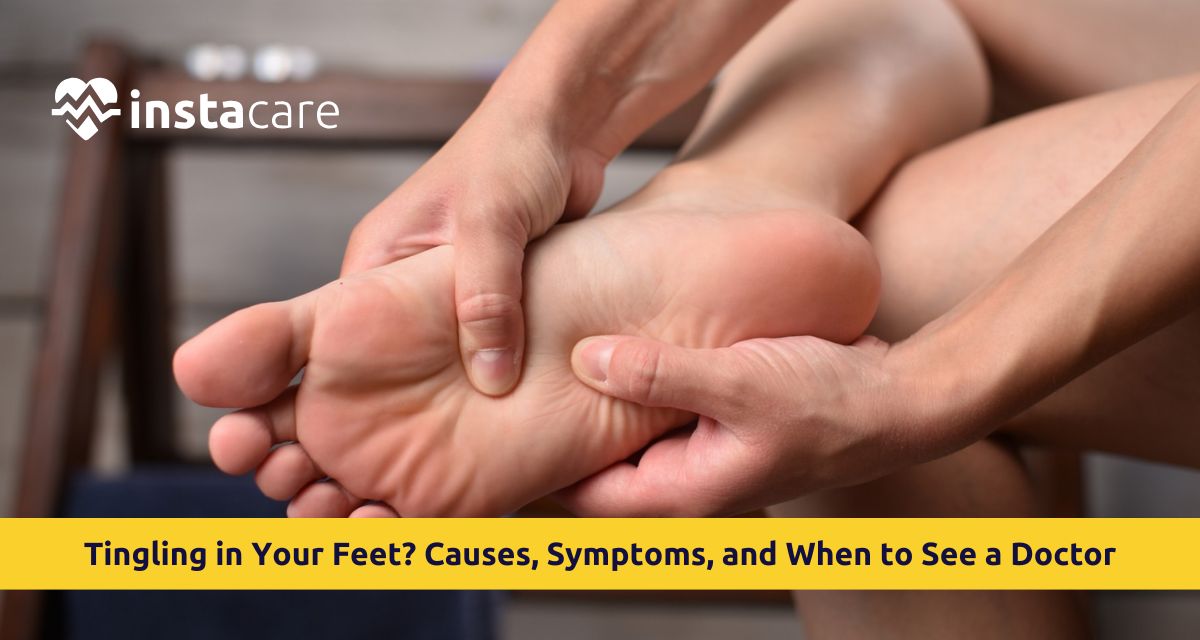What Is Tingling in the Feet?
Common Causes of Tingling Feet
- Peripheral Neuropathy: The most common single cause of chronic tingling of the feet is peripheral nerve damage. The pathophysiologic features of peripheral neuropathy symptoms are tingling and burning dysesthesia of the feet, numbness, stabbing dysesthesia, and hyperesthesia. Diabetes and tingling in feet are as closely bound at a conceptual level in that chronic hyperglycemia slowly damages peripheral nerves along a temporal course and affects almost 50% of diabetics.
- Poor Circulation: Faulty circulation guarantees that nerves are not adequately oxygenated. Peripheral artery disease, thrombosis, or prolonged standing causes poor circulation in feet. This is most likely to cause tingling in feet when walking or exercise.
- Vitamin Deficiencies: Nerve damage is caused by B vitamin deficiency, for instance, B12, B6, and B1. Vitamin deficiency tingling develops over time and involves the hands and feet at the same time.
- Nerve Compression: Herniated disk, tarsal tunnel syndrome, and sciatica all compress nerves that result in tingling in a region. Too-tight footwear or prolonged pressure also temporarily compresses nerves on the feet causing nerve damage in feet.
- Drugs: Some drugs, like chemotherapy, antibiotics, and some heart medications, destroy nerves in feet as a side effect.
- Anxiety and Stress: Hyperventilation that occurs with anxiety attacks alters chemistry of blood, resulting in tingling in feet anxiety attacks.
Related Symptoms to Watch For
- Tingling of Feet and Hands: Excessive symptom association such as tingling in feet and hands is more likely from systemic etiology such as vitamin deficiency, diabetes, or autoimmune disorder than local nerve pathology.
- Night time tingling of feet: Tingling in feet at night nocturnal aggravation of pain can be secondary because of decreased activity, nerve compression due to posture, or conditions such as restless leg syndrome.
- Other warning symptoms: Weakness or gait difficulty, loss of balance, color alteration, swelling, numbness radiating proximally, and bowel or bladder dysfunction all need to be evaluated by a doctor right away.
Diagnosis: How Doctors Identify the Cause?
- Blood Tests: diagnosis of diabetes, vitamin deficiency, thyroid problems, kidney function, and autoimmune testing.
- Nerve Conduction Tests: diagnosis of electrical conduction through nerves, nerve damage in the feet and affected areas.
- Imaging Tests: MRI or CT scan detects the structural issue such as herniated disc or pinched nerve.
- Vascular Tests: ankle-brachial index test and Doppler ultrasound detect blood flow and determine poor flow in the feet.
Read More: Numbness and Tingling: Causes, Symptoms, and Treatment Options
Treatment Options for Tingling Feet
- Treatment of etiological agent: Correction of glucose level in diabetes through exercise, vitamin supplements in vitamins that are deficient, treatment of thyroid pathology, or modification of offending drug in the majority of cases treats the symptoms in due course.
- Medications: Neuropathic pain is avoided by prescription medications gabapentin and pregabalin. Local treatment in the form of capsaicin or lidocaine induces relief of burning or tingling in feet.
- Physical Therapy: Exercise therapy enhances strengthening, coordination, and balancing, and pressure on the compressed nerve reduces. Shoe modification or orthotics may be recommended by the therapists.
- Surgical Procedure: If the etiology is structural and results in compression of the nerve, spinal decompression or tarsal tunnel release needs to be done.
Home Remedies & Lifestyle Tips
- Exercise and Movement: Develop nerve and blood circulation through a daily exercise routine. Do not sit down and stand up often, and continuously change positions to redistribute weight.
- Foot Care: Use support, well-cushioned shoes that never tuck feet under. Inspect feet every day for damage, notably in numbness, which eliminates sensation.
- Warm Soaks: Warm water soaking enhances circulation and pain-free relief on a temporary basis. Refrain from heat that burns skin when loss of feeling occurs.
- Stress Reduction: Relax with practices such as deep breathing, meditation, or yoga to reduce tingling of feet anxiety attacks.
- Modification of Diet: Eat a well-balanced diet rich in B vitamins, no drinking alcohol, and intake of fluids to support nerve well-being.
Prevention Tips for Tingling Feet
- Regulate blood sugar with diet and exercise to ward off diabetic complications.
- Take good vitamins in diversified diet or vitamins.
- Avoid alcohol, which is toxic to peripheral nerves.
- Keep you at your ideal weight to avoid unnecessary pressure on nerves.
- Avoid repetitive activities that lead to nerve compression.
- Periodic check-ups, especially when diabetic or at neuropathy risk, are in order.
When to See a Doctor for Tingling in Feet
Conclusion

